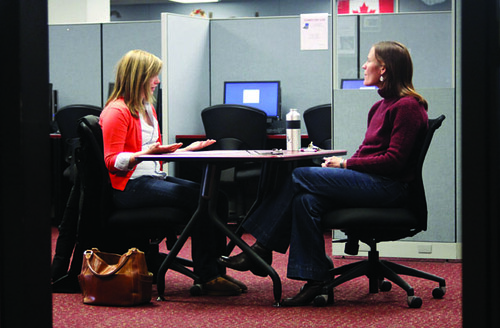Entering the job market can be stressful, but an interview can distinguish any applicant.
Video by Ian Rose and Justin McGoldrick. Hosted by Hanh Nguyen

Senior marketing and international business major Marc Diretto, suffers through a two-day interview with the Lincoln Financial Group, vying for a position on the company’s Leadership Preparation program. Set up like a round robin, Diretto networks with various recruiters, speaking to three different people across a four-hour time span.
Unless he manages to keep his nerve under the pressure and stick out as a desirable candidate among the pool of college graduates and experienced professionals, he’ll lose this opportunity to join one of the most respected organizations in Philadelphia.
He starts in August.
According to a Jan. 19 New York Times article, the unemployment rate for college graduates is 4.8 percent. With the economy slowly getting back on its feet, students must learn to ace an interview if they want to land a professional job and move forward in their careers.
Most interviews graduating students attend are simple one-on-one ordeals, but the actual sit-down requires more than a pretty smile and a polished résumé.
“Your job in an interview is to convince the interviewer that you are the best candidate for the job,” Rachel Brown, the director for the Career Center, said in an e-mail.
Preparation before an interview is crucial. Practicing what to convey during an interview will ready anyone to answer questions efficiently without hesitating or stuttering.
“Confidence is critical,” Brown said. “If you aren’t convinced you are the best candidate, how can you possibly convince someone else?”
As a prospective employee, one must be knowledgeable about a company, its mission and the job position they are looking for. It’s never a good idea to attend an interview without doing a bit of digging.
All of this preparation leads to the ultimate hurdle: the interview. Brown suggests dressing in a conservative manner, meaning no jeans, T-shirts or sneakers.
Although the person asking the questions may be under-dressed, wearing a business suit with Bostonian loafers, or if the interviewee is a female, either a suit or a pencil skirt with a blouse and matching business coat will do fine.
“First impressions are huge,” Diretto said in an e-mail. “I have been told that many recruiters have just about reached a decision within the first 7-to-10 minutes of a 45 minute interview.”
From the business dress attire to the firm handshake, students need to be professional, beginning to end.
“You only have one chance to make a first impression – make it a good one,” Brown said in an e-mail.
Students may sweat bullets out of nervousness, but speaking in a monotone voice, avoiding eye contact and frowning will only produce a negative outcome.
A student must show the interviewer why they are the perfect candidate for the job by setting themself apart from the other applicants.
It’s important for an interviewee to not only say what one can do, but more specifically, what they can do for the company.
Don’t repeat what is on the résumé. The recruiter has already reviewed it – that’s why the interview was set up. It all comes down to the presentation.
Bill Rennie, a senior finance and risk management and insurance major, said it’s all about showing off the personality and turning a question-and-answer session into a conversation.
In one of his many interviews, Rennie said he discovered the person he was interviewing with was from Detroit. From that bit of information, he was able to take the interview into a 10-minute tangent about the Motor City.
“Know your information, about the company and position, and ask good questions. Never leave an interview without asking questions,” Rennie said.
“Interviews are most definitely a two-way street,” Brown said. “You want to find the best fit for you, too. This can be achieved not only by asking questions (which you have prepared in advance) but also by keeping your eyes and ears open when you are on the interview.”
Once the in-person interview is finished, the application process isn’t over. Students must remember to snag a business card from whom they were speaking with. While a decorative basket, piled with fruits, games and other little pleasures is a nice sentiment, a “Thank You” gift is not necessary.
Brown recommends simply sending a card. She suggests, however, making the card just as conversational as the interview. Be sure to thank the interviewer for his or her time, but also tell them something learned through the interaction.
Brown said the interviewer will be pleased to see the person was paying attention, and that he or she demonstrated their ability to take that knowledge and project it onto something else.
Kenneth Thapoung can be reached at kenneth.thapoung@temple.edu.



Be the first to comment